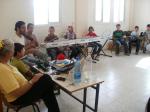Guest Post – Yael Arbel
“You must come to see Susiya.”
In all truth, I am fascinated by the stories I hear about Susya. I have not been there since the cold, muddy winter of 2002, when we trekked with Ta’ayush activists to bring blankets for those living there, only to be detained by the army. I don’t think I even got to see them at the end of that march. [editor comment: that particular march did reach its destination, see here]
“People in Susiya really want to study Hebrew. I think it’s a fitting task for you.”
Yes, I’ll come to look at it.
But only to look, I cautioned myself. I have no time to travel repeatedly from Tel Aviv to Susiya. I have children and a demanding, endless work, and the trip is so long . . . . Well, maybe I can come just once a month to consult them? So I came, and by visit’s end I was explaining that it’s impossible to learn a language with less than a weekly lesson, and so I promised to come again next week. In short, I fell in love with the community.
First, I got to know the renovated tent that became the “Learning and Creativity Center.” The day I visited, physicians and nurses from the Palestinian Health Organization were using the tent to receive patients. Next week, Inbal and I taught there a large, mixed group of boys and girls, young men and women, and adult men (but not adult women). At another corner, an artist taught some residents to crochet old plastic bags. Two months later, I saw the results of his teaching: artistic, colorful creations of embroidery, beautiful and practical.
As time went on, I got to know the Susiya children – those generous, loving hosts of my daughter, who ran with her all over the place, jumping over rocks and winding among the farm animals. To concentrate on my teacher’s role, I stopped bringing her, but the kids kept asking about her, when will she come again. We ate with the kids, danced, played, and attempted to speak Hebrew. They chased a family of geese.
Then I got to know the men, those who had learned Hebrew through work in Israel. Today, very few get to leave Susiya for work, and there are no opportunities to practice their Hebrew. The women know just a few words, and they are fearful of making mistakes. They speak to me in Arabic, hoping I will understand. Each visit I understand a little more.
Inbal and I take a practical approach to teaching Hebrew. Conversation, familiarity with the Alphabet, practical words and Hebrew/Arabic cognates. The boys were immediately drawn to Inbal, recognizing in her the Israeli incarnation of Pippi Longstockings. Meanwhile, I have been teaching a group of girls of various ages, who have shown extraordinary linguistic talents. And I teach the young children as well – writing and playing with letters and words.
I am used to teaching students who already know Hebrew, who are looking for change, for play, for breaking the routine. I am used to teaching kids who live in far greater comfort than Susiya’s kids can ever imagine. Jewish kids, who live in Tel Aviv and study at the Democratic School.
Susiya is entirely different. The students have no pencils. At times, they must leave to do something else more important. The girls may have to watch a young brother or prepare dinner. Other times, they all go out to look at the Settlers amassing on the hills overlooking Susiya. Their mothers don’t attend my lessons; at most they look on from the side. I am waiting for them to accept my invitation to join. But those who come are eager to learn. They want to write in a notebook, to have a dictation, to memorize; they want an authoritative teacher. I am far from authoritative. Our democratic teaching methods strike them as not serious. But they don’t want us to leave. “Just one more sentence,” begs Wuffa. While we pack our bags, Sara and Islam are still seating and reading the pages we left behind. Kusai understands almost everything we say. See, in spite of everything, Hebrew is being taught here!







